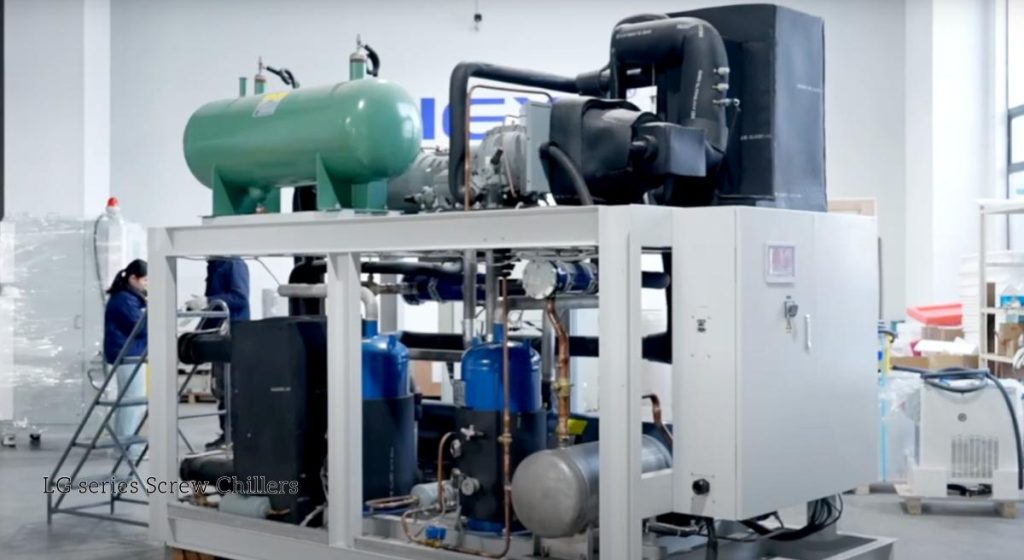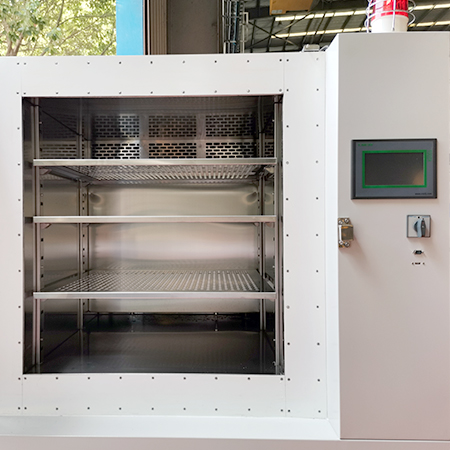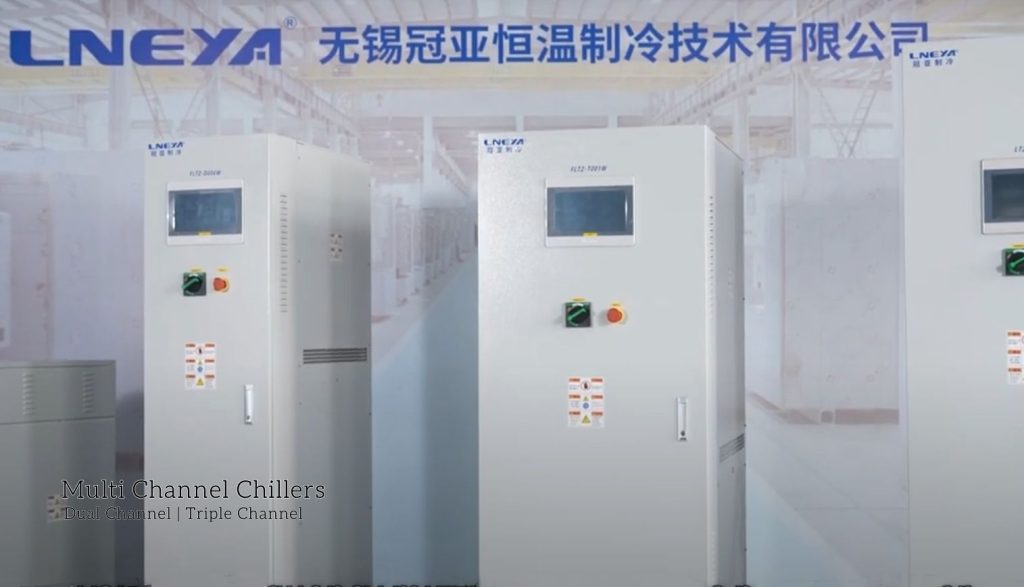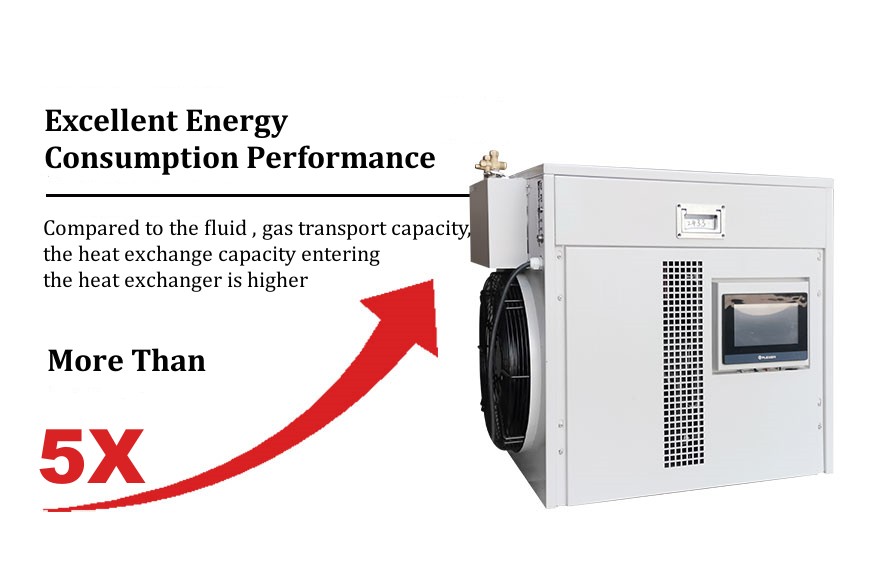Когда вам нужен масляный чиллер
Пройдите в любой механический цех или на производственный участок, и вы это почувствуете — жар. Это не просто побочный продукт, это что-то, что висит в воздухе и мешает вам весь день. Рабочий шпиндель, гидравлический блок под нагрузкой, коробка передач, которая никогда не отдыхает… все они нагнетают тепло в систему. Если не контролировать, вскоре вы заметите более медленные циклы, больший износ деталей и растущее количество заявок на ремонт.
Большую часть времени водяной чиллер справляется с задачей. Но некоторые работы или условия превышают его возможности. Вот когда имеет смысл перейти на масляный чиллер. Примите это решение вовремя, и вы сохраните стабильность процесса, защитите оборудование и избавите персонал от постоянной борьбы с проблемами охлаждения.
Что такое масляный чиллер
Итак, что такое масляный чиллер простыми словами? Представьте себе тот же принцип, что и у водяного чиллера, но с маслом в контуре. Масло проходит через оборудование, забирает тепло и возвращается к устройству. Секция охлаждения чиллера удаляет это тепло, прежде чем отправить масло обратно для нового цикла.
Бонус в том, что масло не только отводит тепло. Оно также помогает деталям работать плавно. Поэтому установка масляного охлаждения часто выполняет двойную функцию: охлаждение и смазка. Вы увидите это в таких местах, как:
• Шпиндели ЧПУ, которым нужны и точность, и плавное вращение
• Гидравлические системы, для которых критична стабильная вязкость
• Редукторы, работающие весь день без замедления
• Турбины, где срок службы подшипников зависит от стабильной температуры смазки
Верно, масло не может переносить столько тепла на литр, сколько вода. Но оно гораздо менее капризно к экстремальным условиям. Оно не закипает при высокой температуре, не замерзает при низкой и более бережно относится к подвижным частям. Поэтому в определённых задачах оно является более разумным выбором.
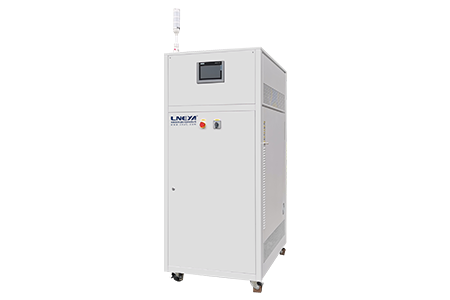
Когда вам нужен масляный чиллер
1. Широкий или высокий диапазон рабочих температур
Вода является отличным охлаждающим средством для умеренного температурного контроля, но у неё есть ограничения. Ниже 0 °C вода замерзает. Выше примерно 90 °C вода может закипеть или превратиться в пар. Даже смеси гликоль-вода имеют практические ограничения при высоких температурах.
Тепловое масло работает там, где вода бессильна. Многие масляные чиллеры могут надежно работать в диапазоне от –20 °C до 120 °C или выше, в зависимости от состава масла. Этот широкий температурный диапазон необходим для:
• Линий экструзии пластика, где масло должно оставаться горячим для обеспечения плавного потока материала
• Металлообработки с высокой тепловой нагрузкой, где вода бы закипела
• Низкотемпературной среды, где существует риск замерзания
Если вашему процессу требуется охлаждение вне безопасного диапазона воды, масляный чиллер — это не просто вариант, а необходимость.
2. Оборудование, требующее охлаждения и смазки
Некоторые устройства не могут работать без постоянной смазки, и эффективно совмещать эту функцию с охлаждением.
Типичный пример — высокоскоростной шпиндель ЧПУ. Подшипники шпинделя нуждаются в масляной смазке для снижения трения и износа, но они также быстро нагреваются под нагрузкой. Система масляного охлаждения циркулирует ту же жидкость как для отвода тепла, так и для смазки компонентов.
Гидравлические системы — хороший пример того, где масляное охлаждение особенно эффективно. Гидравлическое масло не только передает мощность, но и справляется с теплом, возникающим при больших нагрузках. Если насос или исполнительный механизм работают интенсивно, температура масла повышается. При слишком высокой температуре вязкость падает, реакция замедляется, а уплотнения или компоненты насоса изнашиваются быстрее, чем хотелось бы.
Масляный чиллер поддерживает масло в оптимальном температурном диапазоне, чтобы система оставалась эффективной, а компоненты служили дольше.
3. When Water Isn’t the Best Coolant
Конечно, вода дешева и быстро отводит тепло — но она не всегда подходит.
• Риск коррозии — необработанная вода может ржаветь стальные детали или разъедать некоторые сплавы.
• Накопление накипи — минералы в жесткой воде оседают на охлаждающих каналах, со временем ухудшая теплопередачу.
• Риск загрязнения — в пищевой, фармацевтической или других чистых сферах даже небольшая утечка может поставить под угрозу безопасность продукта.
Масло избегает этих проблем. Оно не вызывает накипи и образует защитный слой, который отталкивает влагу от критических деталей. Если вода создаст проблемы или станет риском, масляное охлаждение — более безопасный долгосрочный выбор.
Связано: Масляное охлаждение против водяного охлаждения чиллерной системы
4. Когда требуется чрезвычайно стабильный контроль температуры
Некоторые задачи не терпят колебаний температуры даже на один-два градуса. Если вы соблюдаете допуски прецизионной обработки, поддерживаете стабильную вязкость гидравлической жидкости или предотвращаете термическое искривление при сборке, масло может помочь.
Вода быстро переносит тепло, но это также означает, что её температура может быстро меняться — особенно при резких изменениях нагрузки или окружающей температуры. Масло обладает большей тепловой массой и вязкостью, поэтому оно медленнее реагирует на изменения температуры. Иными словами, оно сглаживает пики, действуя как тепловой буфер, который поддерживает стабильность процесса.
5. Когда вы хотите меньше обслуживания
Системы водяного охлаждения требуют постоянного контроля: проверка pH, добавление ингибиторов коррозии, дозирование биоцидов. Даже при правильной обработке образуются накипь и загрязнения, и приходится останавливать оборудование для очистки.
Масляные чиллеры работают иначе.
В основном это проверки качества масла, замена фильтров и замена масла по установленному графику. Контур закрытый, поэтому загрязнения редки — и химическая обработка не требуется.
Для объектов с ограниченным обслуживающим персоналом или процессов, где простой дорог, масляные чиллеры могут означать меньше хлопот и больше времени работы оборудования.
Заключение
An oil chiller isn’t the answer to every cooling job—but in the right setting, it can beat water hands down.
If you’re running high temps, need cooling and lubrication in one loop, want tighter temperature stability, or can’t afford constant maintenance, it’s worth a serious look.
At LNEYA, we build oil chillers for everything from CNC spindles to heavy process systems.Whether you need a compact unit or a high-capacity setup, our engineers can match you with a system that keeps your operation running smoothly.

- What Does a 200 Ton Chiller Cost
- Temperature Control in Photolithography
- Is a Used Chiller a Good Idea
- Chiller Components and Refrigeration Fundamentals Guides
- Chiller Types and Selection Guides
- How Does a Peltier Cooler Work
- Peltier Chiller vs. Compressor Chiller
- What Is a Peltier Chiller
- Декабрь 2025
- Ноябрь 2025
- Октябрь 2025
- Сентябрь 2025
- Август 2025
- Июль 2025
- Июнь 2025
- Май 2025
- Март 2025
- Февраль 2025
- Январь 2025
- Декабрь 2024
- Ноябрь 2024
- Октябрь 2024
- Сентябрь 2024
- Август 2024
- Июль 2024
- Июнь 2024
- Май 2024
- Апрель 2024
- Март 2024
- Февраль 2024
- Сентябрь 2023
- Июль 2023
- Июнь 2023
- Май 2023
- Январь 2023
чиллер с воздушным охлаждением чиллер Установка чиллеров Chiller Maintenance chiller refrigerant чиллеры Морозильная камера охлаждающий чиллер система охлаждения отопления система охлаждения система динамического контроля температуры энергоэффективный чиллер взрывозащищённый чиллер морозильная камера циркулятор отопления промышленный чиллер промышленные чиллеры промышленное охлаждение промышленный морозильник промышленный холодильник реактор с рубашкой лабораторный охладитель низкотемпературный охладитель новости Масляный чиллер технологический охладитель производственное охлаждение охладитель реактора охлаждение реактора охлаждение реактора нагрев охлаждение нагрев реактора рефрижераторный циркулятор винтовой охладитель полупроводниковый охладитель охладитель для испытаний полупроводников сунди tcu контроль температуры испытательная камера термостат сверхнизкотемпературный охладитель охладитель для испытаний автомобилей охладитель воды чиллер с водяным охлаждением
Связанные охладители
СВЯЗАТЬСЯ С НАМИ
TEL:
EMAIL:
WeChat & WhatsApp:

Wechat QR

Есть вопрос или нужно получить предложение? Заполните форму ниже, и наша команда свяжется с вами в течение 24 часов.
 LNEYA Промышленные чиллеры Производитель Поставщик
LNEYA Промышленные чиллеры Производитель Поставщик









